Decadence and Regeneration in d’Annunzio’s Il piacere (1889)
IF 0.2
3区 文学
0 LITERATURE, ROMANCE
引用次数: 0
Abstract
Abstract This paper considers the dialectics between national decadence and regeneration in d’Annunzio’s Il piacere. It argues that the novel’s fin-de-siècle reception was conditioned by the author’s prior classification as an immoral, anti-national writer in the wake of the poetry collection Intermezzo di rime. This classification determined a reading of d’Annunzio’s debut novel in terms of decadence, while Il piacere itself actually pointed toward a literature of regeneration. The novel staged d’Annunzio’s opposition to his own prior classification, while making claims for a more committed and more internationally relevant model of Italian literature in the context of European modernity.达南奇奥《广场》(1889)中的颓废与重生
摘要本文考察了达南奇奥《广场》中民族衰亡与民族复兴之间的辩证法。它认为,这部小说的最终结局是由作者在诗集《间奏曲》(Intermezzo di time)之后被归类为不道德、反国家的作家所决定的。这种分类决定了从颓废的角度解读达南奇奥的处女作,而《天堂》本身实际上指向了一种复兴的文学。这部小说提出了达农齐奥对自己先前分类的反对,同时主张在欧洲现代性的背景下,意大利文学有一个更坚定、更具有国际相关性的模式。
本文章由计算机程序翻译,如有差异,请以英文原文为准。
求助全文
约1分钟内获得全文
求助全文
来源期刊

ROMANCE QUARTERLY
LITERATURE, ROMANCE-
CiteScore
0.30
自引率
50.00%
发文量
18
期刊介绍:
Lorca and Baudelaire, Chrétien de Troyes and Borges. The articles in Romance Quarterly provide insight into classic and contemporary works of literature originating in the Romance languages. The journal publishes historical and interpretative articles primarily on French and Spanish literature but also on Catalan, Italian, Portuguese, and Brazilian literature. RQ contains critical essays and book reviews, mostly in English but also in Romance languages, by scholars from universities all over the world. Romance Quarterly belongs in every department and library of Romance languages.
 求助内容:
求助内容: 应助结果提醒方式:
应助结果提醒方式:


